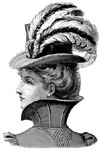
Beautiful Words About Women
KIERKEGAARD AGAINST FEMINISM
To write on Kierkegaard’s thought is an act of daring. In a way this is true of many philosophers. One only need think of the various interpretations given to Aristotle.
Those acquainted with the voluminous literature written about the greatest Danish philosopher (and Kierkegaard remarked wittingly that “there is only one”) will face a similar difficulty. Who was he? One thing is certain: Søren Kierkegaard seemed to derive an impish pleasure from putting us off track. To my knowledge, no other thinker has written a series of works under various pseudonyms. When he published Either/Or (a work which unlike most of his publications enjoyed great success), it was rightly suspected that the witty young man might be the author. He denied it in very strong terms, but later acknowledged his authorship. He made this confession at a time when he simultaneously claimed that none of his early works contain a single word which is his! Yet, Walter Lowrie, a devoted admirer of Kierkegaard, argues that several of them contain valuable biographical information.
In a remarkable book published posthumously, The Point of View for My Work as an Author, Kierkegaard informs us that his intention from the very beginning of his career as a writer was religious — something which is surprising indeed if one reads such works of his as Either/Or. He intimates that, given the secularized nature of Denmark, the indirect way of communication was the one which had a chance of catching the attention of “this individual who is my reader” and bringing him to Christianity (later, however, he changed his mind). Kierkegaard was definitely a committed Christian.
It is not my purpose here to discuss some of the contradictory interpretations of his thought that scholars have offered; such would call for a whole book. In the framework of this article, my modest concern is to shed some light on Kierkegaard’s views on women. His position is ambiguous; he has written about them both beautifully and spitefully. Deal Hudson, in his book An American Conversion, tells us that he did not like Kierkegaard because the latter “did not like women” — a remark likely to attract the sympathies of the fair sex.
I am going to take to Kierkegaard’s defense and show that the few regrettable things he wrote about women are largely compensated by the beautiful things he wrote about them, and that his insights into the female personality and role in human and religious life could only come from the pen of someone who has loved.
You May Also Enjoy
If the Fatima story had occurred in the days of the Old Testament, it would have been made into a book of the Bible — prophecy-filled, drama-packed, and miracle-rich.
Renewed scholarly interest in gnosticism has been, for the most part, remarkably sympathetic, as if it represented an important corrective and alternative to Christianity.
The "trigger warning" movement seeks to scrub college campuses clean of words and ideas that might cause discomfort, hurt feelings, or negative thoughts. Almost everything has this potential.

